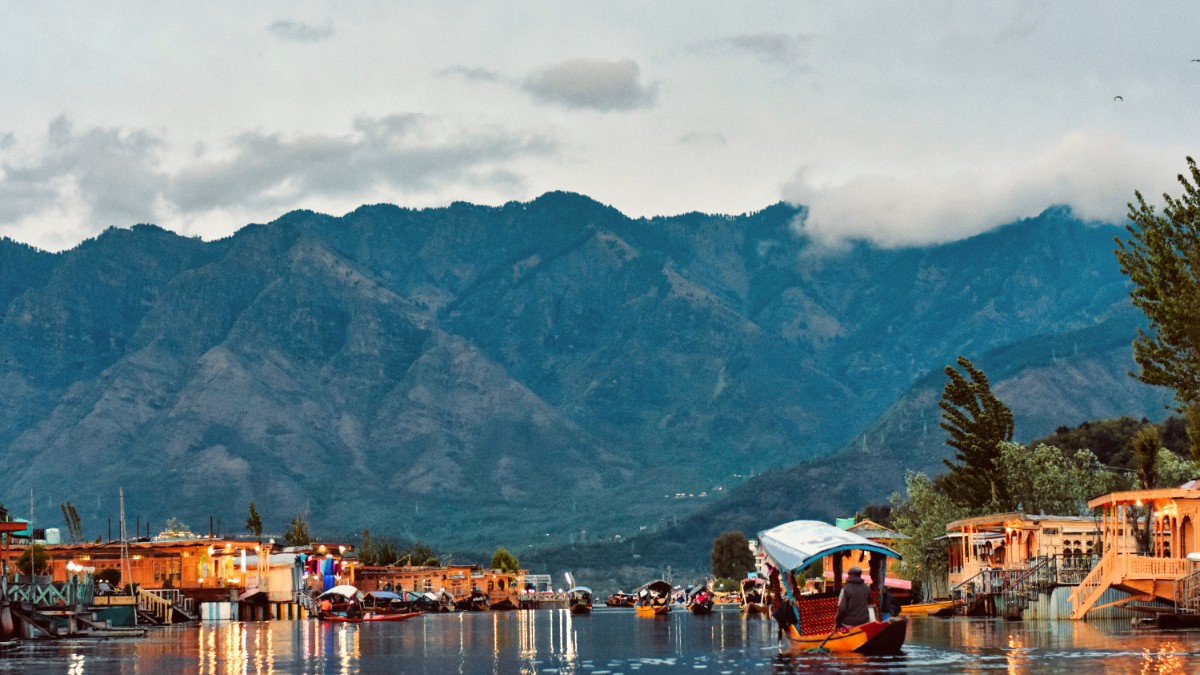
Jammu And Kashmir, India
Spring (March to early May): Temperatures range from 10°C to 25°C (50°F to 77°F). This period brings pleasant weather, with moderate temperatures comfortable for outdoor activities. Precipitation is minimal, mostly light showers. Nights can still be cool.
Summer (Mid-May to August): Temperatures range from 20°C to 30°C (68°F to 86°F). These are the warmest months, suitable for extensive outdoor exploration and water activities on the lakes. The summer brings light rainfall, typically not heavy, which helps keep the landscape lush. Humidity is generally low, making for agreeable conditions. Clear skies mark this period for panoramic views.
High Season (May to October): The weather is ideal for most sightseeing and outdoor activities. All attractions, including the Mughal Gardens and lake activities, function fully. Higher prices for accommodation, flights, and tours are common. Popular areas see larger crowds.
Shoulder Season (March-April & November): Pleasant weather occurs, especially during the spring bloom. November presents beautiful fall colors. Fewer crowds are present, and better deals on accommodation often appear. Weather can be unpredictable.
Pros & Cons
Snow-covered landscapes, unique winter ambiance, ideal for winter sports (Gulmarg). Prices for travel and lodging are typically at their lowest. The city feels peaceful.
Very cold temperatures, heavy winter clothing is necessary. Heavy snowfall can lead to road closures. Many houseboats may close.
Specific Activities
Spring (March-May) for blooming gardens and comfortable weather. Early Summer (May-June) also brings pleasant conditions.
Mughal Gardens, Shikara rides, exploring the city. Longer daylight hours in summer.
Specific Activities
Summer months (June-August) present the most suitable conditions, with accessible trails and mild temperatures at higher altitudes.
Winter (January-February) is the only time for skiing and other snow sports, mainly in nearby Gulmarg.
Foreign nationals typically require an Indian visa. The process varies by nationality and trip purpose. An Indian e-Visa suits travelers for tourism, recreation, casual visits, or short-term medical treatment. The online application is through the official Indian Visa Online portal. It requires document uploads and online payment. Processing times vary, so early application is advisable. Upon approval, an Electronic Travel Authorization (ETA) arrives via email. For other categories or longer stays, a regular sticker visa application occurs at an Indian embassy or consulate, typically with an in-person interview and more documentation.
For both e-Visa and regular visas, certain documents are consistently necessary: a valid passport (at least six months validity, two blank pages), a recent digital photograph meeting specific requirements, and a scanned copy of the passport biographical page. Travelers may need to provide additional documents, like flight itineraries, hotel bookings, or a letter of invitation, depending on visa type and nationality. Always consult official guidelines for current requirements.
Minimum 6 months validity from entry date, 2 blank pages.
Meets specific size and background requirements.
A clear digital copy of your biographical page.
For e-Visa holders upon arrival.
Flight itineraries, hotel bookings, invitation letters may be requested.
Managing your finances forms an important part of travel planning. Srinagar presents options for various budgets, from frugal travel to luxury experiences.
The local currency is the Indian Rupee (INR), symbol ₹. ATMs are widely available in commercial areas like Lal Chowk and Boulevard Road. They accept international debit and credit cards (Visa, MasterCard, Maestro). Notifying your bank of your travel plans is advisable.
Tipping in Srinagar is common and appreciated, though generally not obligatory. It indicates satisfaction with service.
This budget embraces high-end experiences and superior comfort. Costs generally exceed INR 9,000 per day.
Being informed about common health concerns, local safety measures, and emergency contacts is a wise step for any traveler to Srinagar.
Required Vaccinations: If arriving from or transiting through Polio-affected countries, India generally expects proof of Polio vaccination via an International Certificate of Vaccination (ICV). A Yellow Fever vaccination certificate is also expected for travelers from Yellow Fever endemic countries. Check the latest guidelines from your national health authority or the WHO.
Recommended Vaccinations: Consult a travel health clinic well in advance (ideally 4-6 weeks before departure) for personalized recommendations. Common recommendations for travel to India include Hepatitis A and B, Typhoid, Tetanus, Diphtheria, Pertussis (Tdap), Measles, Mumps, Rubella (MMR), and Rabies (for high-risk travelers).
Srinagar has several healthcare facilities. Sher-i-Kashmir Institute of Medical Sciences (SKIMS) and Government Medical College (GMC) Srinagar are prominent public hospitals. Various private clinics also offer medical services. Pharmacies are widely available, providing common medications.
For serious conditions, consider private hospitals or travel to Delhi for specialized care.
Emergency Services: Dial 112 (National Emergency Number) for general emergencies.
Always use bottled water from reputable brands. Check the seal on the bottle before opening. Avoid drinking tap water. When consuming food, especially from street vendors, choose places with high customer turnover where food is cooked fresh. Observe vendor hygiene practices. Avoid salads or uncooked vegetables washed with tap water, and unpeeled fruits.
Only consume bottled water with an intact seal. LifeStraw offers water filtration products.
Avoid tap water, uncooked vegetables, and unpeeled fruits to prevent traveler's diarrhea.
Srinagar is generally considered a safe destination for tourists, notably in well-known tourist areas like Dal Lake, Boulevard Road, and the Mughal Gardens. These areas benefit from a visible security presence. Like any urban area, petty crime, like pickpocketing, can occur in crowded markets or busy tourist spots.
Remain aware of your surroundings, especially in crowded areas. Pacsafe provides anti-theft products.
Strictly avoid political demonstrations or large gatherings. Stay informed via local news or embassy advisories.
| Risk | Description | Mitigation |
|---|---|---|
| Earthquakes | The region is seismically active. | Familiarize yourself with emergency procedures at your accommodation. |
| Landslides | Occur during heavy rainfall or snowmelt, especially on mountain roads. | Can cause road closures. Plan for flexibility. |
| Heavy Snowfall | In winter, it disrupts travel, leads to road closures, power outages. | Plan for flexibility during winter months. |